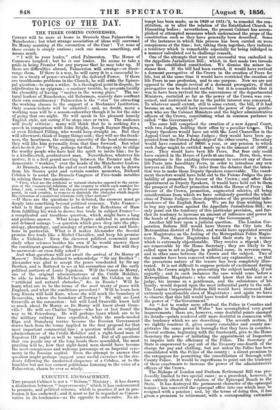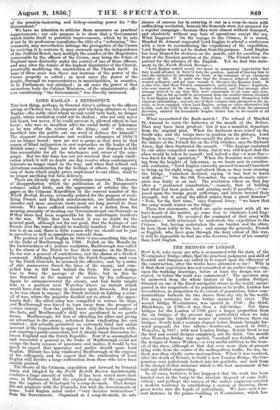EXECUTIVE ENCROACHMENT.
Tim present Cabinet is not a "Reform" Ministry.; it has drawn a distinction between "improvements," which it has endeavoured to promote, and political reforms, which in practice if not in profession it has eschewed ; and it must so far be regarded as Conservative in its tendencies—as the opposite to subverePre. No at
tempt has been made, as in 1829 or 1831-'2, to remodel the constitution or to alter the relation of the Established Church to Dissenting bodies; nevertheless, the present Cabinet has accomplished or attempted measures which undermined the props of the constitution such as they have generally been described. Some of the instances in which this process has been carried on were conspicuous at the time ; but, taking them together, they indicate a tendency which is remarkable especially, for being indulged in a manner calculated not to challenge remark.
One of the attempts that were not successful was embodied in the Appellate Jurisdiction Bill; which in fact made two inroads upon the established constitution. We dismiss the minor instance first If the bill had been carried, it would have revived a dormant prerogative of the Crown in the creation of Peers for life, but at the same time it would have restricted the creation of life Peers to one profession, and to one purpose. Now we are not opposed to the simple revival of a dormant prerogative, if that prerogative can be rendered useful ; but it is remarkable that it was to have been revived for the convenience of the departmental Ministers, curtailed so far as the power of the Crown was concerned, and restricted so far as the public interest was concerned. To whatever small extent, still to some extent, the bill, if it had become an act, would have increased the power of those gentlemen who are the Cabinet Ministers and the higher administrative officers of the Crown, constituting what in common parlance is called "the Government."
The same bill comprised the creation of a new Appeal Court, with two Judges, holding their ciao° by a peculiar tensre. The Deputy Speakers would have sat with the Lord Chancellor in the Appeal Court as his Puisne Judges ; they would have been appointed from the Puisne Judgeships of the other courts. The salary would have consisted of 50001. a year, or any pension to which such Judge might be entitled made up to the amount of 50001. a year. They would have been life Peers. But four only could have existed in the House of Lords at one time. Here, then, were temptations to the existing Government to convert any of those life Peers into hereditary Peers, in order to introduce any new lawyers as life Peers. We infer from the debates that the intention was to make those Deputy Speakers removeable. The enactment therefore would have held out to the Puisne Judges the probability of promotion by favour of the Crown ; and after their appointment as Deputy Speakers, it would have held out to them the prospect of further promotion within the House of Peers the favour of the Crown promotion, augmented salaries, all being considerations from which we have sedulously guarded the whole class of Puisne Judges—those depositories of the proverbial independence of the English Bench. We are far from wishing here to beg any question against the Appellate Jurisdiction Bill • we only point out the tendency of this particular provision, and fur
its tendency to increase an amount of influence and power in the hands of the gentlemen forming "the Government."
Another bill bore upon a judicial question.. The London Corporation Reform Bill would have thrown the City into the Metropolitan district of Police and would have appointed several new Magistrates on the footing of the Metropolitan Police Magistrates. Now, those Magistrates hold their seats by a tenure which is extremely objectionable. They receive a stipend ; they are removeable by the Home Secretary; they are likely to be called upon to act as judges in political eases, in revenue cases, and in other cases between the Crown and the subject. Two of the number have been removed without any explanation ; so that the precarious nature of the tenure has been completely illustrated. It is not difficult to suppose periods of excitement during which the Crown might be prosecuting the subject harshly, if not unjustly and in such instances the case would come before a Metropolitan Magistrate ; who would know that his seat as a judge, his income as a gentleman' and the subsistence of his family, would depend upon the most influential party in the suit. The London Corporation Reform Bill would have increased that extremely questionable class of Magistrates : and again we have to observe that this bill would have tended materially to increase the power of "the Government." An "Act to render more effectual the Police in Counties and Boroughs in England and Wales" has accomplished very great improvements : there are, however, same doubtful points amongst its details—points rendered still more doubtful in connexion with the tendency which we are describing. The seventh section, if we rightly construe it, gives county constables and county magistrates the same power in boroughs that they have in counties. Several sections, beginning with the fourteenth, give to the Home Secretary the power onnitiating the appointment of Inspectors to inquire into the efficiency of the Police. The Secretary of State is empowered to pay out of the Treasury one-fourth of the charge for pay and clothing, but not unless the Police has been consolidated with the Police of the county ; a direct premium to the ratepayers for permitting the consolidation of Borough with County Police. It would be superfluous to point out the tendency of these enactments to increase the power of the administrative officers of the Crown.
The Bishops of London and Durham Retirement Bill was professedly limited to two special cases ; as a precedent, however, it has entirely. altered the relation of the Episcopal Bench to the State. It has destroyed the permanent character of the episcopal tenure ; has converted the episcopal office into one which may be resigned with a pension ; and, by the terms of doing this, it has given a premium to retirement, with a corresponding extension
of. the pension-bestowing and bishop-creating power for "the Government."
We have no intention to criticize these measures as practical improvements ; our sole purpose is to show that a Government which limits itself to practical improvements, which by its acts if not by its professions repudiates the title of a " reforming " Government, may nevertheless infringe the prerogative of the Crown by reviving it to restrain it, may encroach upon the independence of the Judicial Bench, may multiply the number of the Magistrates removeable by the officers of the Crown, may bring the Police of England more distinctly under the control of one of those officers, and may alter the tenure of the highest dignitaries of the Church, practically modifying the constitution of the Church itself. In none of these cases was there any increase of the power of the Crown properly so called ; in most cases the power of the people, through its representatives in municipalities, in counties, or in Parliament, was abridged ; in all cases the power of that anomalous body the Cabinet Ministers, of the administrative officers constituting "the Government," was directly increased.

























 Previous page
Previous page